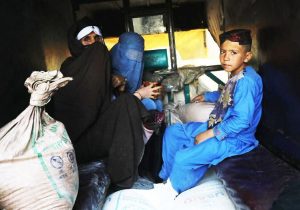Taliban relocation plan could trigger fresh humanitarian crisis in Afghanistan
A Taliban plan to return millions of internally displaced Afghans to their home villages and provinces could worsen the country’s humanitarian crisis, aid organisations say.
The Taliban’s Ministry of Refugees and Repatriation announced the plan recently, saying that in phase, 5,000 displaced families in Kabul would be moved to different places to their places of origin.
Most of these families are from the northeastern province of Kunduz.
The Taliban called on national and international organisations to support their relocation plan.
Head of the NGO Selab Charity Foundation Sayed Ahmed Selab told international media that many families wanted to return to the homes but a forced move “could bring about a humanitarian crisis under the current circumstances”.
“Most of these families would not have shelter, if they were returned to their provinces,” he said.
“They were displaced because of the yearslong conflict and drought. Most of them lost their houses and would have no prospects of jobs and places to live if they were returned,” Mr Selab said.
The United Nations refugee agency UNHCR says there are 3.2 million internally displaced people (IDPs) in Afghanistan.
More than 7.6 million Afghans are living as refugees in Pakistan and Iran, including 1.6 million Afghans who left after the Taliban’s takeover in August 2021.
Twelve months ago, both Iran and Pakistan started forcible repatriation of Afghan refugees from their countries. The Taliban government said in June that around 2,000 Afghans were arriving daily from these countries.
 Observers and NGOs say that Taliban does not appear to have any policy in place for the relocation plan.
Observers and NGOs say that Taliban does not appear to have any policy in place for the relocation plan.
“For the repatriation of internally displaced people, there is the need to construct schools and provide shelters and health services. The Taliban don’t have the resources to do so,” a UNHCR spokesperson said.
The Taliban would need the support of the international agencies and foreign donors to provide this infrastructure but are yet to be recognised nationally and internationally.
The Taliban, which seized power in August 2021 after the former Afghan government collapsed, are not yet recognized as the legitimate government of Afghanistan by any country.
Under the Taliban, Afghanistan is facing a series of crises. Sanctions against the Taliban include no banking transfers, frozen assets, no access to global institutions and the dwindling of foreign aid has meant millions of people have fallen into poverty and hunger.
The UNHCR has reported that there are 11.6 million people who are food insecure in Afghanistan.
In September, the United Nations said that it received only 30 per cent of the $3 billion needed this year for the humanitarian response in the country.
Since returning to power, the Taliban have imposed repressive measures on women and imposed their strict interpretation of Islam in the country.
“The de facto authorities are exacerbating this crisis by policies that focus insufficiently on the real needs of its people and undermine its economic potential,” said the UN’s special representative in Afghanistan Roza Otunbayev.












